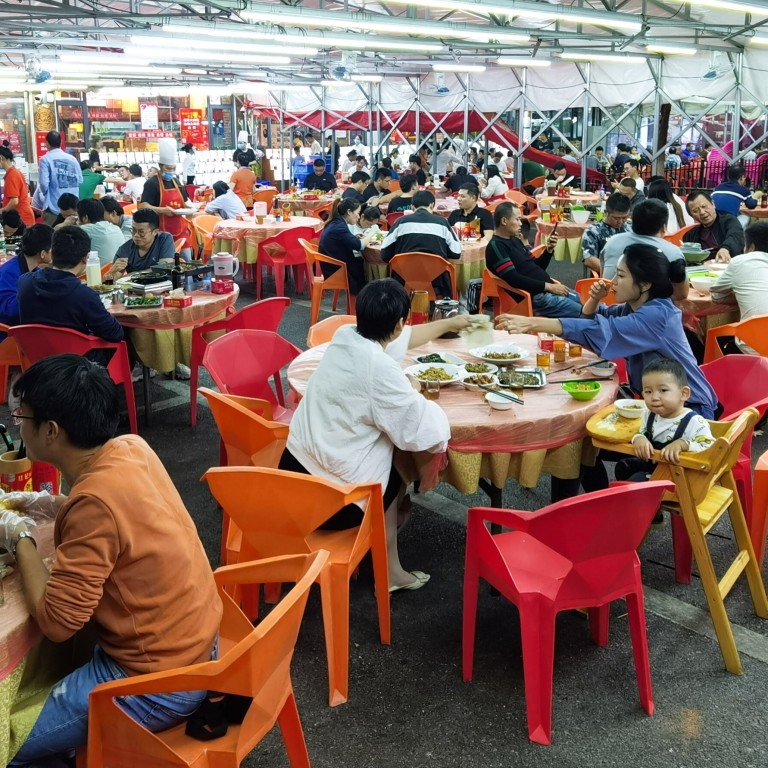
China’s service sector looks to shine during ‘golden week’ as Beijing eyes stronger domestic spending
- Eight-day holiday period offers chance for China’s tourism sector to bounce back, but domestic travel is expected to be down from same time last year
- Economist Yu Yongding says consumer spending may not be a strong growth driver this year, as many Chinese have income concerns in post-coronavirus climate
Pent-up demand for services – from travel to entertainment to eating out – could drive Chinese spending during the “golden week” national holiday period that starts on Thursday, but a short-term boost is unlikely to help the domestic service sector fully recover this year from the damage caused by the coronavirus.
China is the world’s first major economy to return to growth since the coronavirus emerged, but the recovery has depended mainly on government-led industrial production and investment.
Given that, the eight-day mainland holiday is likely to serve as a litmus test for the momentum of the service sector in the world’s second-largest economy. The nationwide break, from October 1-8, is a day longer than last year, as National Day and Mid-Autumn Festival both fall on the same day.
“The holiday will be an important opportunity for China’s tourism sector to warm up and recover, and tourism consumption may reach a new high for this year,” food-delivery giant Meituan said in a report last week.
The company forecast that the total revenue from domestic travel during the coming week could recover to around 91 per cent of last year’s holiday level.
The domestic tourism industry generated 649.71 billion yuan (US$95.3 billion) in revenue during the seven-day golden week in 2019, up 8.47 per cent from the previous year, according to the Ministry of Culture and Tourism.
Domestic tourism should also benefit from a lack of foreign travel, given that countries such as the United States, France, Spain and Britain are experiencing new waves of coronavirus infections. China’s Ministry of Foreign Affairs advised citizens on Monday to avoid any unnecessary travel abroad during the holiday.
“Outbound tourism has almost stagnated, [but] a large portion of overseas travel demand will be satisfied domestically, and this will provide an opportunity for growth in domestic tourism spending,” the Meituan report said.
The total number of domestic flight trips from October 1-8 will surpass 15 million, up 10 per cent from last year, according to the online booking platform Qunar.
The agency estimated that about 600 million trips will be made during the eight-day period. In a separate forecast, the China Tourism Academy, a research institute under the tourism ministry, expected the number of domestic trips to reach 550 million.
But both figures would still represent a decline from a year ago, when China recorded 782 million domestic tourists and more than 7 million outbound travellers during the shorter holiday period.
China’s railway network is expected to carry 108 million passengers during the 11-day period from September 28 to October 8, China State Railway Group said on Monday. It carried 138 million passengers during last year’s holiday period.
Cinema box office presales for October 1 were also down considerably, having reached 194.33 million yuan as of Wednesday afternoon – or just 23.8 per cent of the box office sales on the same day last year, according to entertainment data analysis platform Maoyan.
“The rate of consumption growth will not be too fast – at least not as rapid as we hoped,” Yu Yongding, one of China’s most renowned economists, said at an economic forum on Friday. “Many people talk about retaliatory spending; I think overall this won’t happen.”
Many ordinary people who were forced to tap into their savings to get through the pandemic are still worried about where their income will come from, and that will make it difficult for consumer spending to be a strong growth driver this year, Yu said.
Ahead of the long holiday, Chinese consumer spending has recovered slowly from the pandemic, falling in each of the first seven months compared with last year, before recording a small 0.5 per cent rise in August.
For 2020 as a whole, domestic tourism spending was forecast to be only half that of last year, with domestic tourist numbers expected to be 43 per cent less than in 2019, according to the China Tourism Academy.
Many Chinese tourists have chosen to shorten their travel distance and duration during the coming golden week, rather than take longer and more costly trips, as shown in surveys conducted by multiple online booking platforms.
Virus control measures will also prevent many undergraduate students – a major consumer spending force in previous years – from travelling during the holiday.
Fearing new infections, many universities across the country have imposed restrictions since reopening in early September, including cutting back on the duration of the October holiday period to as little as one day, as well as requiring strict checks on the movement of students onto and off of campus.
The timing and scale of the recovery of retail sales will be largely influenced by the development of a vaccine for Covid-19
The ratio of 18- to 24-year-olds planning to travel this holiday is far smaller than last year, according to a report by Muniao, a short-term home-sharing platform.
Lu Ting, chief China economist at investment firm Nomura, said the pandemic had dealt a devastating blow to lower-income earners, particularly migrant workers who lack unemployment insurance coverage but tend to have a higher propensity to consume.
The rapid rise in household debt over the past decade also has had a negative impact on household consumption during this economically challenging period, Lu wrote in a note last week.
“The timing and scale of the recovery of retail sales will be largely influenced by the development of a vaccine for Covid-19,” Lu said.

